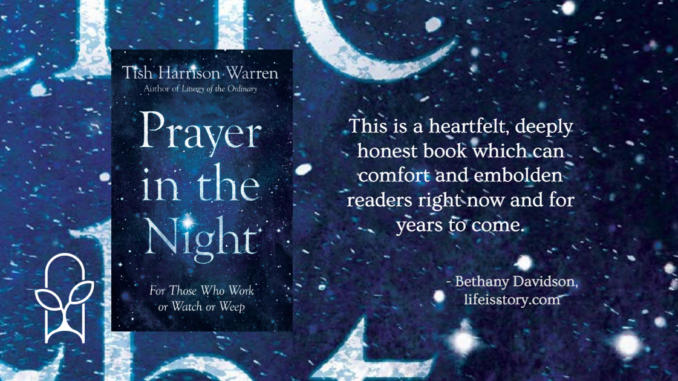
Also by this author: Little Prayers for Ordinary Days, Jesus Changes Everything: A New World Made Possible
Published by IVP on January 26, 2021
Genres: Non-Fiction, Christian Life, Memoir, Theology
Buy on Amazon
Goodreads

How can we trust God in the dark? Framed around a nighttime prayer of Compline, Tish Harrison Warren, author of Liturgy of the Ordinary, explores themes of human vulnerability, suffering, and God's seeming absence. When she navigated a time of doubt and loss, the prayer was grounding for her. She writes that practices of prayer "gave words to my anxiety and grief and allowed me to reencounter the doctrines of the church not as tidy little antidotes for pain, but as a light in darkness, as good news." Where do we find comfort when we lie awake worrying or weeping in the night? This book offers a prayerful and frank approach to the difficulties in our ordinary lives at work, at home, and in a world filled with uncertainty.
In Prayer in the Night: For Those Who Work or Watch or Weep, Tish Harrison Warren shares about how the prayer of Compline encouraged her during the darkest period in her life. This was in 2017, when her father died and when she experienced two miscarriages, and she writes about her experiences and larger themes of grief and loss. In the author’s note at the beginning, Warren explains that even though she wrote this book during the early stages of COVID-19, she chose not to reference it within the work, because she knew that her future readers would know far more about it than she did. Still, even though this book is not dated with specific references to our current disaster, this book can be especially helpful right now as people struggle through their daily grind with familiar comforts ripped away and heavy griefs to process.
Warren is a priest in the Anglican tradition, and in this deeply personal book, she combines memoir and theological reflection to show how liturgical prayers have helped sustain her faith during times when she could not find the words to talk to God. Throughout this book, she uses the traditional prayer of Compline as a starting point to explore different phases of life and types of suffering, and she is deeply honest about her personal afflictions and the hope that she has experienced anyway because of God’s faithfulness. She never softens the harsh realities of the world, and even encourages her readers to think deeply about them, showing that a robust faith is most possible when Christians are willing to face the reality of darkness.
This book is a rich theological reflection about the nature of life, death, and faith. Warren never rushes her readers ahead to triumphal hope, and challenges them to sit with a clear-eyed knowledge of the darkness, but she also reminds us again and again that our pain has meaning, and that within Christ, we can be confident that suffering, futility, and death do not define our stories. Warren emphasizes the promise of the resurrection, and the truth that God’s love is the “fixed center of our lives and of eternity.” This is a heartfelt, deeply honest book which can comfort and embolden readers right now and for years to come.
